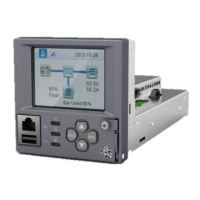Vertiv™ NetSure™ Control Unit (NCU) User Manual
• Proportion Coeff: The proportional coefficient that the power system designated as “System A” in a "Power Split"
configuration is set to. It is suggested to leave this value at the default (30%).
• Integral Time: The integral time that the power system designated as “System A” in a "Power Split" configuration is set to. It
is suggested to leave this value at the default (60 seconds).
The NCU controller uses these parameters to control the load sharing operation between the two power systems.
Depending on the systems’ configurations, their rectifier capacities, their distribution load capacities, and the Power Split
configuration; four operating modes can occur.
Low Load Operation
When the total load current demand is lower than the Power Split Current Limit Value, the NCU power system voltage will be
increased by the programmed DELTA VOLTAGE setting forcing the NCU power system to carry the load. Make sure that the output
voltage does not exceed the battery float range recommended by the manufacturer. In this operating mode, no current will be
delivered by the existing power system.
Normal Load Operation
When the total load current demand reaches the Power Split Current Limit Value, the NCU power system operates in output current
limit and its output voltage will be decreased (up to the DELTA VOLTAGE setting) in order to regulate the current, allowing the
existing power system to deliver the remaining current. Both the NCU power system and the existing power system are now
providing current to the load.
High Load Operation
If current demand increases and the existing power system reaches its current limit setting, float voltage will again begin to decrease.
When the voltage falls below the float setting minus the DELTA VOLTAGE setting, the NCU system will come out of current limit and
now deliver the additional current necessary to satisfy the load. This operation may occur when the batteries are being recharged,
such as after a commercial AC failure.
Over Load Operation
If the load current is greater than the combined current capacities of the NCU system and the existing power system, both power
systems will go into current limit. Both systems and the batteries will feed the load. The output voltage will depend on the conditions
of the batteries. This operation occurs if the total capacity of the rectifiers is too low in relation to the need for increased current.
Operating Modes
Figure 1.5 illustrates the four modes of operation described above.
The Normal Load Operation is considered to be the normal mode. In this mode both the NCU system and the existing parallel power
system are both delivering load current. This is main purpose of using Power Split, to avoid putting the burden of delivering the entire
load onto one of the two power systems.
Requirements and Conditions
The two DC power systems must be connected in parallel as described in “Paralleling the Existing and NCU Power Systems” on page
53.
Before paralleling the two systems, the following conditions must be met for proper Power Split function.
NOTE!
The control features of the combined system are limited to those of the original power system.
NOTE!
The same type of batteries with an equal amount of cells and the same charging voltages must be used for both
systems.

